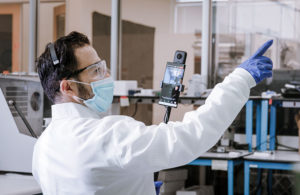
Image courtesy of Avatour
Site meetings are an integral part of business for life sciences companies — whether supplier audits, internal quality assurance inspections, process reviews, or FDA inspections. Often, these site visits involve traveling long distances to bring auditors, experts, or global teams together. Pre-COVID, the pharmaceutical and biotechnology industries spent enormous budgets on travel costs.
Direct expenses aren’t the only cost of these meetings. Those who travel for site visits incur a significant overhead of productive time lost in airports and hotels. On-site safety, security and cleanliness protocols are time-consuming and disruptive, often requiring the interruption of production for days at a time. And every outside individual brought into a lab or production facility creates some amount of risk.
Until now, life sciences companies have accepted these costs because there were few if any alternatives. Site inspections and reviews are necessary to ensure quality and compliance, and transparency is crucial to controlling risk across the entire production process. As the life sciences industries become increasingly global, maintaining quality standards has required more travel. But the emergence of COVID-19 has forced a reckoning.
Pandemic impact
COVID-19 was a sudden shock to supply chains in every industry, and the life sciences were no exception. As a result, companies faced challenges both for external evaluations and internal operations.
Externally, the FDA halted all but mission-critical visits in response to the pandemic. Now, they face approximately 23,000 inspection backlogs with no clear direction on addressing the outstanding inspections. This has huge implications for the pharmaceutical and biotechnology industries, as companies wait for FDA feedback to approve their products.
Internally, companies had to create a real-time protocol for keeping the product lifecycle moving through global lockdowns. In many cases, this involved rapidly adopting remote collaboration technologies to keep meetings going while ensuring the safety of teams and personnel.
The outbreak underscores the importance of having a remote collaboration infrastructure in place. While many companies adopted standard videoconferencing platforms like Zoom and Microsoft
Teams, these technologies serve only basic conferencing needs.
With the changes over the past few years, there is no doubt that the future of collaboration in life sciences companies will be different. For example, 62% of respondents in a Parenteral Drug Association survey said they are fundamentally shifting how they will conduct audits. Furthermore, the FDA is currently using remote interactive evaluations to pre-screen candidates to discern if an inspection is needed.
Many companies use a risk-based approach to discern visits that require in-person versus others that can be successfully conducted from afar. The key to this hybrid model is in remote collaboration.
Purpose-built remote technologies
Purpose-built remote technologies can mitigate most of the cost and logistical challenges associated with traditional site visits. These tools allow for real-time interaction and collaboration between teams, regardless of their location. However, not all remote collaboration tools are created equally. For example, most standard remote platforms are limited to a single point of view. To be a viable tool for life sciences, a remote collaboration platform must provide the detail and context needed to make a judgment call on the safety or process of a facility.
They must also provide a high degree of clarity throughout the entire inspection. For example, live, 360-degree shared context platforms were designed to enable site meetings and provide remote participants with the viewer autonomy needed to understand and interact with a space. Remote collaboration designed for site meetings gives participants – in many cases auditors or stakeholders – the power to choose their point of view and interact on site.
Benefits of hybrid protocol
A hybrid protocol can offer life sciences companies a way to reduce the need for travel while still meeting regulatory requirements. This approach is based on a sound, risk-based methodology that is a better fit for the FDA and the global healthcare industry.
With remote tools at their disposal, companies can make more informed decisions about conducting remote audits rather than doing so out of necessity. In addition, being on-site more often helps companies better prepare for FDA inspections and be better equipped to support FDA remote interactive evaluations. The ability to be on-site remotely not only leads to improved external preparedness but helps companies improve internal quality management and process efficiencies.
Use savings to drive innovation
Above all, companies can reallocate funds otherwise spent on travel to innovation. For example, the cost of an average three-day business trip is between $1,200 – $2,525 per person. Since audits alone can take between 2 and 3 days, this cost can be staggering. Therefore, sending a team of auditors to just four supplier facilities per year will be well over $100,000. Large, multinational corporations face millions of dollars in annual travel budgets due to several tiers of internal audit practices. Finally, companies can leverage the savings with increased productivity, better internal morale, and improved competitive positioning without time lost to unnecessary travel.
Results and future implications
After two years of playing catch up, companies can make strategic decisions that will impact future innovation. And, with future uncertainty surrounding FDA and other regulatory protocols, having a flexible, hybrid audit protocol helps companies stay one step ahead, able to adapt to sudden changes.
If there’s one thing that’s certain about the future of the life sciences, it’s that quality management will be an even higher priority. In fact, according to the 2021 FDA/PDA joint regulatory conference, the FDA is considering a system to evaluate, rate, and ultimately reward a company’s quality management maturity.
What was once a necessity is now an opportunity to create a future beyond distance. Remote collaboration puts companies in a strategic position to define a more quality-focused and future-forward collaboration protocol while reaping cost and time-saving benefits that will ultimately improve their effectiveness.

Devon Copley
Devon Copley is co-founder and CEO of Avatour, the only remote collaboration platform designed for site meetings. The company’s real-time 360° communication technology enables remote users to work more effectively with on-site personnel, saving money and time while reducing carbon emissions.
An expert on live immersive technology, Devon has over two decades of experience as an entrepreneur, investor and technologist in digital media, spanning online video, SaaS platforms, and virtual reality. Before Avatour, Devon was Head of Product for the Nokia OZO VR platform. He led the expansion of the OZO ecosystem to include live VR broadcast, next-generation immersive delivery, and multi-platform playback. Previously, he was an early employee and VP Customer Success at cloud video unicorn Kaltura (KLTR). He co-founded the online media consulting firm Interocity (acquired by Chyron) and was a fellow at the Berkman Center for Internet & Society at Harvard.
Devon has a Bachelors’ degree in Computer Science and Psychology from Yale and a Masters’ degree in Business from The Stanford University Graduate School of Business.